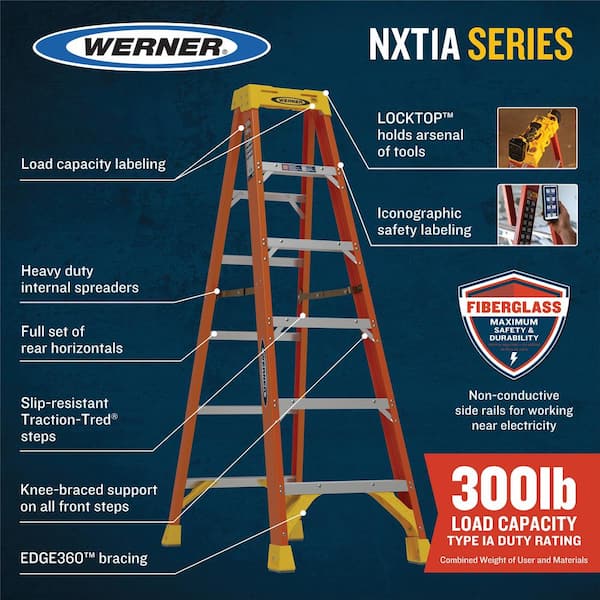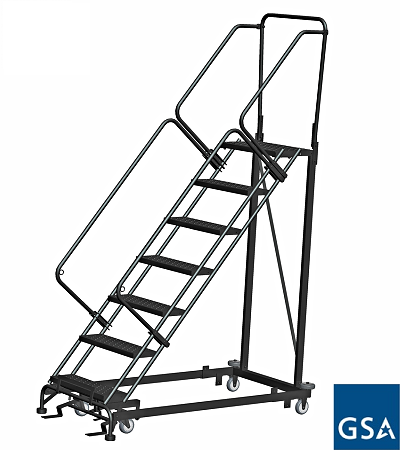Ladders come in various weights. Their heaviness depends on size, material, and type.
Understanding how heavy ladders are is important for safety and convenience. Whether you are a homeowner, a professional contractor, or someone who needs a ladder occasionally, knowing the weight can help in making informed choices. From light aluminum ladders to heavy-duty fiberglass ones, each type serves different needs.
This blog will explore the factors that influence ladder weight, offering insights to help you choose the right one. Stay with us to learn everything you need to know about the weight of ladders and how it impacts their use and portability.

Credit: www.amazon.com
Types Of Ladders
Understanding the different types of ladders is crucial. Each type serves unique purposes and comes with distinct features. This section will guide you through the diverse kinds of ladders available in the market.
Materials Used
Ladders are made from various materials. The choice of material affects the ladder’s weight, durability, and application.
- Aluminum: Lightweight and corrosion-resistant. Ideal for general use.
- Fiberglass: Non-conductive and strong. Perfect for electrical work.
- Wood: Traditional and sturdy. Best for indoor tasks.
Common Types
Ladders come in several types, each designed for specific tasks. Knowing these types helps you choose the right one.
- Step Ladders: Self-supporting and versatile. Used for most household tasks.
- Extension Ladders: Adjustable length. Ideal for reaching high places.
- Telescoping Ladders: Compact and portable. Suited for transport and storage.
- Platform Ladders: Provide a stable work surface. Great for painting and maintenance.
- Multi-Position Ladders: Configurable into different shapes. Useful for various tasks.
| Type | Material | Weight |
|---|---|---|
| Step Ladder | Aluminum, Fiberglass, Wood | 10-30 lbs |
| Extension Ladder | Aluminum, Fiberglass | 20-50 lbs |
| Telescoping Ladder | Aluminum | 15-25 lbs |
| Platform Ladder | Aluminum, Fiberglass | 20-40 lbs |
| Multi-Position Ladder | Aluminum, Fiberglass | 25-50 lbs |

Credit: www.homedepot.com
Factors Affecting Weight
Understanding the weight of ladders is crucial for safety and ease of use. Several factors influence the weight of a ladder, making it essential to consider these aspects before purchasing or using one. Below, we delve into the key factors that affect the weight of ladders.
Material Composition
The material composition of a ladder significantly impacts its weight. Ladders are typically made from three main materials:
- Aluminum: Lightweight, rust-resistant, and easy to transport.
- Fiberglass: Heavier than aluminum, non-conductive, and durable.
- Wood: Heaviest, traditional, and sturdy but prone to weather damage.
Choosing the right material depends on the intended use and required portability.
Ladder Length
The length of the ladder is another crucial factor affecting its weight. Longer ladders naturally weigh more due to the additional material used. Here’s a quick comparison:
| Ladder Length (Feet) | Weight (Pounds) |
|---|---|
| 6 | 15-25 |
| 12 | 30-50 |
| 24 | 60-80 |
Longer ladders are suitable for higher tasks but are heavier to handle.
Design And Features
The design and features of a ladder also play a role in its weight. Ladders come in various designs, each with unique features:
- Step Ladders: Compact and lightweight, ideal for indoor tasks.
- Extension Ladders: Adjustable length, heavier due to additional sections.
- Multi-Purpose Ladders: Versatile, often heavier due to complex design.
Additional features like platforms, trays, and safety locks add to the overall weight. It’s essential to balance the need for features with the ladder’s portability.
Comparative Weights
Choosing the right ladder can be difficult. One important factor is the weight. Different materials make ladders heavier or lighter. Understanding these differences helps in making the right choice.
Aluminum Vs. Fiberglass
Aluminum ladders are usually lighter. They are easy to carry and handle. The average weight of an aluminum ladder is between 20 to 40 pounds.
Fiberglass ladders, on the other hand, are heavier. They provide more stability and strength. The weight of a fiberglass ladder ranges from 30 to 60 pounds.
| Material | Average Weight |
|---|---|
| Aluminum | 20-40 pounds |
| Fiberglass | 30-60 pounds |
Wood Vs. Metal
Wooden ladders are heavier than aluminum but lighter than fiberglass. They offer a good balance of weight and strength. The typical weight of a wooden ladder is between 25 to 50 pounds.
Metal ladders, which include aluminum and steel, vary in weight. Steel ladders are the heaviest. They can weigh up to 100 pounds. Aluminum ladders are lighter, as mentioned before.
| Material | Average Weight |
|---|---|
| Wood | 25-50 pounds |
| Steel | 50-100 pounds |
In summary, understanding the weight of ladders based on their materials helps. It ensures you choose the right ladder for your needs.
Impact Of Ladder Weight
The weight of a ladder significantly affects its usability. Lighter ladders are easier to handle but may lack stability. Heavier ladders provide more stability but can be cumbersome. Understanding the impact of ladder weight helps you choose the right ladder for your needs.
Ease Of Use
Ladder weight directly influences ease of use. A lighter ladder is simple to set up and adjust. For tasks requiring frequent movement, a lighter ladder is ideal. Heavier ladders, though stable, can be hard to maneuver. For prolonged projects, this can lead to fatigue.
Transport And Storage
Transporting and storing a ladder involves its weight. Lighter ladders are easier to carry and fit into smaller storage spaces. Heavy ladders often need more storage room and effort to move. Consider your storage space and transport needs when choosing a ladder.
Choosing The Right Ladder
Choosing the right ladder is crucial for safety and efficiency. The weight of a ladder plays a significant role in this decision. The right ladder can make a difference in both ease of use and safety.
Considerations For Home Use
For home use, focus on lightweight and easy-to-handle ladders. These ladders should be easy to move and store.
- Material: Aluminum ladders are lightweight and rust-resistant. They are ideal for home use.
- Height: Choose a ladder that reaches the height you need. A step ladder is usually sufficient for most indoor tasks.
- Weight Capacity: Ensure the ladder can support your weight plus any tools you might carry.
Here’s a quick comparison of common home use ladders:
| Type | Weight | Common Use |
|---|---|---|
| Step Ladder | 10-20 lbs | Indoor tasks like painting or changing bulbs |
| Extension Ladder | 25-40 lbs | Outdoor tasks like cleaning gutters |
Considerations For Professional Use
For professional use, durability and safety are paramount. Heavy-duty ladders are essential for daily use.
- Material: Fiberglass ladders are durable and safe around electricity.
- Height: Choose a ladder that extends to the necessary height for the job.
- Weight Capacity: Professional ladders should support heavier weights and additional equipment.
Professional ladders often have higher weight capacities and are built to withstand rigorous use. Consider the following:
| Type | Weight | Common Use |
|---|---|---|
| Multi-Position Ladder | 35-55 lbs | Versatile tasks on different job sites |
| Platform Ladder | 30-50 lbs | Extended work on a stable platform |

Credit: www.platformsandladders.com
Safety Considerations
Understanding the weight of a ladder is crucial for safety. Ladders come in various sizes and materials, impacting their weight. Knowing how heavy a ladder is can help prevent accidents. This section covers the key safety aspects related to ladder weight.
Weight Capacity
Each ladder has a specific weight capacity. This refers to the maximum weight it can safely support. It includes the weight of the user and any tools or materials. Exceeding this limit can cause the ladder to break or collapse.
- Type I: 250 pounds
- Type II: 225 pounds
- Type III: 200 pounds
Choose a ladder with a weight capacity suitable for your needs. Always check the manufacturer’s guidelines before use.
Stability And Balance
Heavy ladders tend to be more stable. This is especially true for tall or extension ladders. A heavier base helps keep the ladder from tipping. But balance is also important.
Here are some tips for maintaining balance:
- Place the ladder on a flat surface.
- Ensure all four feet are secure.
- Do not overreach or lean too far.
Stability and balance are key to ladder safety. Always use a ladder as intended.
Frequently Asked Questions
How Much Does A Typical Ladder Weigh?
A typical ladder weighs between 20 to 40 pounds. It depends on the material and size.
What Factors Affect A Ladder’s Weight?
Material and length are the main factors. Aluminum ladders are lighter. Fiberglass ladders are heavier.
Are Aluminum Ladders Lighter Than Fiberglass Ones?
Yes, aluminum ladders are generally lighter. Fiberglass ladders are heavier but offer more durability.
Does Ladder Size Impact Its Weight?
Yes, longer ladders weigh more. A 20-foot ladder is heavier than a 10-foot ladder.
Can I Carry A Ladder By Myself?
It depends on the ladder’s weight and your strength. Smaller ladders are easier to carry alone.
Conclusion
Understanding ladder weights helps you choose the right one. Heavier ladders offer stability. Lighter options provide easy transport. Each type meets different needs. Always check the ladder’s weight rating. This ensures safety during use. Knowing ladder weights aids in making informed decisions.
Proper ladder choice enhances work efficiency. Remember to balance weight and functionality. Your task becomes safer and easier. Next time, consider ladder weight before buying. It makes a difference.
